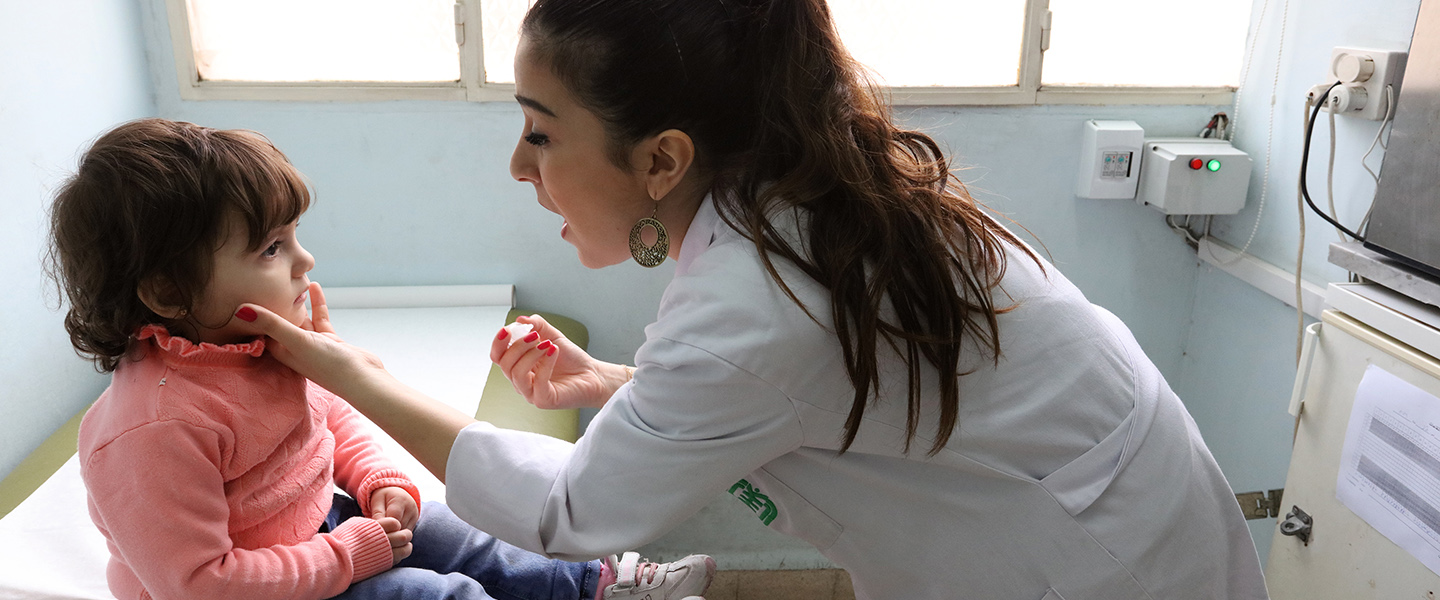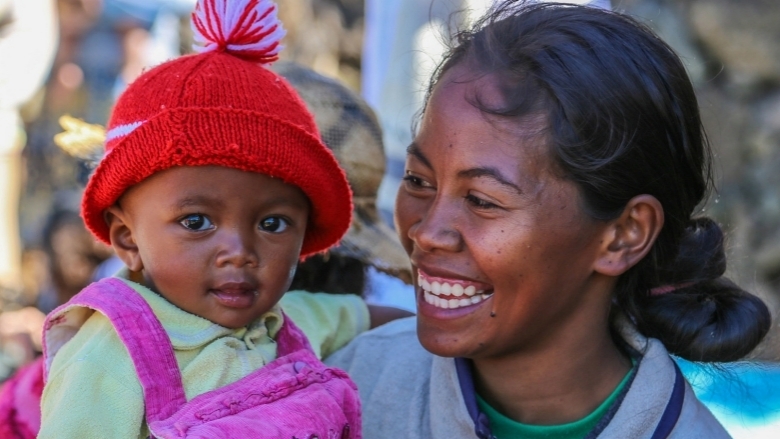Globally the incidence of infectious diseases has declined since 2000, but they continue to have major health and economic costs. Infectious diseases can lock people into poverty, undermine the resilience of communities, and have devastating consequences for a country’s economy.
Caused by pathogenic microorganisms, such as bacteria, viruses, parasites or fungi, infectious diseases, also known as communicable diseases, can be spread directly or indirectly from one person to another. Reducing the spread of infectious diseases globally is beneficial for a population’s health and a country’s economy, and an essential prerequisite for achieving universal health coverage (UHC), where everyone can obtain quality health services without suffering financial hardship. Reaching the goal of UHC requires prevention of and access to quality treatment for infectious diseases, including malaria, TB and HIV, as well as adequate sanitation. It also requires countries to invest resources in pandemic preparedness and the strengthening of their health systems.
To help with this, the WBG works with countries to ensure that essential health interventions for infectious diseases, including surveillance, prevention, early detection, and treatment, are adequately planned, costed, and budgeted for in national health sector plans and carried out in a sustainable manner. The WBG has also made important contributions towards the immunization of children and vulnerable populations against preventable infectious diseases.
Vaccines
Vaccines, which are biological preparations that improve immunity to a particular disease, are a vital part of disease prevention and one of the most cost-effective investments in health and economic development. Immunization can prevent the suffering and death associated with infectious diseases like polio, measles, and pneumonia. Yet, the World Health Organization (WHO) estimates that 1.5 million children under the age of 5 lose their lives to vaccine-preventable diseases every year.
The WBG strongly supports childhood immunizations, as expanding access to vaccines is crucial for eliminating infectious diseases and achieving UHC. The WBG was one of the founding members of Gavi, the global Vaccine Alliance working to create access to new and underused vaccines for children living in the world’s poorest countries.
The WBG is also a global partner in the fight to eradicate polio, working with the Global Polio Eradication Initiative (GPEI), a public-private partnership led by national governments with five partners, including Rotary International and the Bill & Melinda Gates Foundation. The WBG has invested almost $US 600 million in projects to strengthen routine immunization and to help eliminate polio in the three countries where the disease remains endemic: Nigeria, Pakistan, and Afghanistan. Work is also being done in countries affected by instability and conflict. In Yemen, for example, where the crisis has taken a heavy toll on the country's children, the WBG has channeled its funding through the WHO and UNICEF to continue to provide critical support for the delivery of essential health services, including national polio campaigns. This has contributed to the vaccination of 1.5 million Yemeni children under 5.
HIV/AIDS
Ensuring universal access to HIV services is a key part of achieving UHC. There were 37.7 million people worldwide living with HIV in 2020, half of which are women and girls. 79% of female adults aged 15 years and older had access to treatment and just 68% of male adults had access. Without effective HIV prevention, the number of people requiring treatment will grow and may become unsustainable for countries and health systems.
The WBG pioneered global HIV and AIDS financing early on during the crisis and has been a key part of the response ever since. The WBG offers financing, specialized technical support, and knowledge to countries for effective prevention of new HIV infections, care and treatment for people living with HIV/AIDS, the alleviation of social and economic consequences for affected communities, and programs that address the underlying social and structural drivers of HIV.
Since 1989, WBG financing for programs that support HIV and AIDS-related prevention, and treatment outcomes has totaled over $US9 billion. Specifically, through the International Development Association (IDA), the WBG’s fund for the poorest, between 2000 and 2014 the WBG ensured that 1.3 million adults and children received antiretroviral combination therapy; purchased and/or distributed 386 million condoms for the prevention of HIV, sexually transmitted diseases, and unwanted pregnancies; and trained 2.6 million health personnel to improve the quality of health services delivery. The WBG has funded about 50,000 community AIDS organizations globally, helping to create effective community responses in more than 50 countries.
Malaria
Malaria continues to take a high toll on households and health care systems, and impedes economic development in endemic countries. It is estimated that malaria reduces GDP growth by approximately 1.3% per year in some African countries. While robust investments in malaria control over the past decade have yielded remarkable returns, half the world’s population still remains at risk of malaria, and transmission is ongoing in 95 countries and territories. Sub-Saharan Africa continues to carry a disproportionately high share of the global malaria burden.
In response, the WBG treats financing for malaria control as an integral part of financing for essential health services in the context of UHC. The most cost-effective interventions against malaria include the use of long-lasting, insecticidal-treated mosquito nets, seasonal malaria chemoprevention (SMC), effective case management (rapid diagnosis and effective treatment), and indoor residual spraying. The WBG works with countries to ensure that essential health interventions (including malaria) are effectively and sustainably integrated in national health sector plans.
Between 1989 and 2011, there were 73 WBG-financed health projects with malaria control activities; of which 42 projects were in Africa. Under the Malaria Booster Program (2005-2010), the WBG committed almost US$ 1 billion for malaria control in Africa and India. The WBG also has a $US 73.2 million program for SMC, which aims to prevent malaria in young children in areas of higher transmission, and specifically highly seasonal areas, covering the border districts of Burkina Faso, Mali, and Niger. The WBG’s malaria strategy also extends to sectors other than health. A $US 42 million malaria program covering the Senegal River Basin (including Senegal, Mali, Mauritania, and Guinea) was embedded in a larger Water Resource Development Project covering the same countries. In addition to these investments, the WBG is a founding member of the Roll Back Malaria Partnership, which serves as a global framework for implementing a coordinated response against malaria.
Tuberculosis (TB)
For the first time in many years, data suggest that the absolute number of tuberculosis (TB) cases has been falling since 2006. Despite this achievement, in 2015 10.4 million people developed TB with an estimated 480,000 people developing multidrug-resistant TB (MDR-TB). That same year, 1.8 million people, including 400,000 suffering from the double burden of TB and HIV, died from the disease. The Southern Africa region is at the epi-center of both epidemics. The combined effects of the TB and HIV/AIDS epidemics poses significant public health and economic challenges and threaten development gains made within the Southern African Development Community (SADC) region.
The WBG is committed to helping countries control and reduce the spread of TB, a necessary step for achieving UHC. The WBG does this by supporting TB control programs directly and by strengthening health and social protection systems, public housing and environment, and tobacco control measures. The WBG also supports the goals of the WHO’s End TB Strategy.
From 2005-2012, the WBG had 17 projects on TB control in 16 countries and three multi-country projects. For example, from 2002 to 2010, the WBG-supported China Tuberculosis Control Project—the largest effort of its kind ever conducted—provided access to effective TB control services in 16 provinces, covering an estimated 680 million Chinese citizens. The project reduced TB-associated deaths by 770,000, and prevented 20 million people from being infected by TB and 2 million people from falling ill. The project was financed by an international partnership, including US$ 101.44 million from the WBG.
In Southern Africa, the WBG is funding the region’s efforts to scale-up the response to TB in line with the 2012 SADC Declaration on TB and the SADC Health Protocol. The 2016 US$ 122 million, IDA funded Southern Africa Tuberculosis and Health Systems Project is working to support efforts to tackle TB in Lesotho, Malawi, Mozambique, and Zambia and to help strengthen these countries' health systems. The project targets underserved populations with a high TB and/or TB/HIV burden, including mining communities, transport corridors, and cross-border areas. In addition, under the South Africa Knowledge Hub, the WBG initiated the Southern Africa TB in the Mining Sector Initiative, which is taking an innovative and a more harmonized regional approach to tackling TB among mineworkers in the area.
Neglected Tropical Diseases (NTDs)
Although neglected tropical diseases (NTDs) are preventable and treatable, they affect over 1 billion of the world’s most vulnerable, disadvantaged people and cost developing economies billions of dollars every year. This group of communicable diseases, which includes river blindness, elephantiasis, trachoma, soil-transmitted helminths, and schistosomiasis, prevail in tropical and subtropical conditions in 149 countries, with Africa experiencing over 50% of the world’s NTD burden.
NTD-focused interventions must be in a country’s basic package of health care services in order for nations to achieve UHC. The WBG has been part of the long-running public-private partnerships that have supported efforts to fight these diseases. In 1974 an agreement by then WBG President Robert McNamara to establish a Partnership to Control River Blindness was among the first World Bank health projects. It was also one of the most successful, effectively reaching millions in Africa. To date, the WBG has committed some US$ 160 million to NTDs in Africa from a combination of national and regional programs, including the Senegal River Basin Project and the Sahel Malaria and Neglected Tropical Diseases Project, which focuses on integrating NTD treatment in Burkina Faso, Mali, and Niger of five preventable NTDs and preventing and treating malaria.
This global fight against NTDs was revolutionized in 2012, when leaders from the largest pharmaceutical companies came together with global health and development organizations, including the WBG, in London and pledged to unite in their efforts to support the WHO’s roadmap on NTDs. The roadmap set targets to enhance control, prevention, elimination, and eradication of these diseases by 2020. The Neglected Tropical Diseases Summit took place in Geneva, Switzerland, in April 2017 to mark the 5th anniversary of the WHO roadmap, during which the WBG renewed its commitment to these targets.


